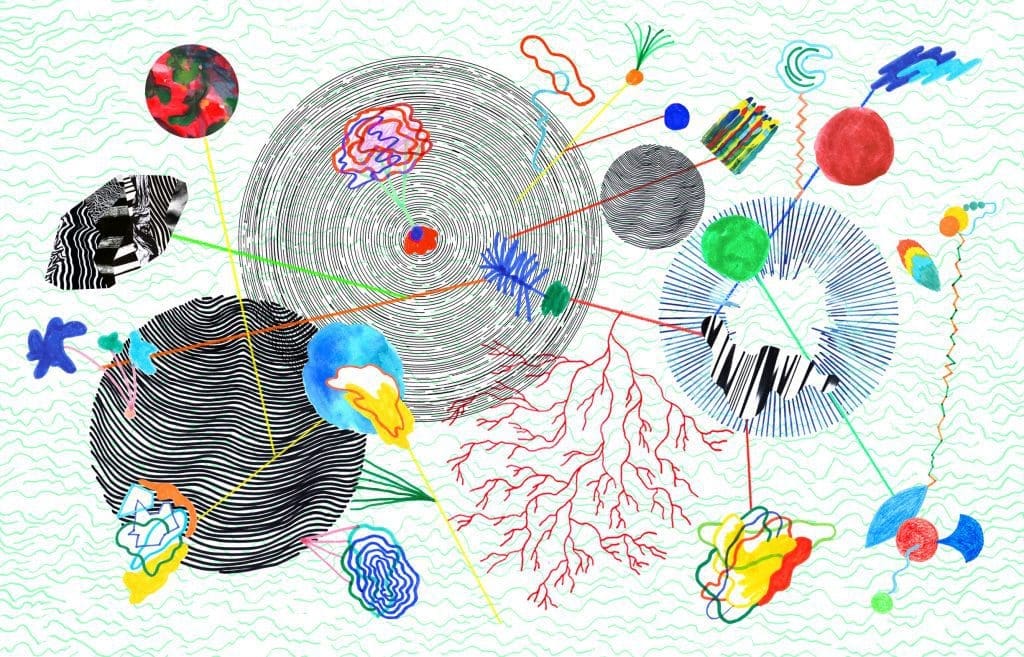(editor’s note) Challenged for its ethnocentrism and the legacy of colonialism and global capitalism, the term “world music” raises questions. Should we update our words, that carry, summon and shape our imaginations and our sensibilities ? Words that have consequences for the material conditions of creation, distribution and reception of the works produced.
Four articles open this reflection:
- a sociolinguistic point of view, with an investigation by researcher Philippe Blanchet
- a journalistic point of view with the analysis of Shiba Melissa Mazaza
- a musicological point of view, with a study by ethnomusicologist Marta Amico
- an artistic point of view, with a collection of testimonies from artists of different generations by Anne-Laure Lemancel.
Is the term “world music” useless or even awkward ? Four artists from the sector, of different ages and backgrounds - producer Martin Meissonnier, Congolese-born pianist Ray Lema, electro-Maloya artist Dilo and Moroccan singer Oum - question the term… And sometimes grit their teeth.
1987, in a discreet pub in the heart of London, a handful of representatives of the British musical elite, including Peter Gabriel, founder of the Realworld label (Nusrat Fateh Ali Khan, Papa Wemba…) and of the Womad festival, meet and try to “market” these sounds from non-Western countries, which the public is becoming increasingly fond of. According to legend, after some discussion, the team agreed on the term “world music”, which would encompass all these disparate musics under its banner. The label soon arrived in France, soon to be translated as “musiques du monde” (in French, the term music is used in its plural form). Among the pioneers of these sounds from elsewhere, the reactions were not long in coming: “I thought it was rubbish, straightforward”, Martin Meissonnier recalls with enthusiasm, almost 40 years later. The journalist, director, DJ and producer of Fela Kuti, King Sunny Ade, Ray Lema and Manu Dibango - among others - does not mince his words. He, who has been an ardent defender of this music from other horizons since the 1970s, does not see the slightest use for this fabricated term. “Before 1987, people looked for Fela Kuti by name in record shops. That’s it,” he says, “I started to get interested in these artists through jazzmen. Just as Debussy, for example, had a passion for the Javanese gamelan (see the Focus on Traditional music, a new lease of life for classical music), Coltrane had a passion for African music. Or Don Cherry, whom I produced, integrated Tibetan influences into his creations. Their quest? Pushing the harmonic limits, playing complex rhythms, rethinking tonality… I myself have always wanted to find excellent artists, just excellent artists, whether they are from here or elsewhere: Okay Temiz, Trilok Gurtu…”. And Meissonnier recalls the teeming musical diversity that made Paris quiver in the 1970s and early 1980s: “The Wagram Venue, packed to the rafters, trembled under the onslaught of the Haitian compass of Shleu-Shleu… The Malian homes of Montreuil were alive with breathtaking Mandingo songs. And then, in 1978, in a packed Bataclan, without a single white person, I attended Franco’s concert, dumbfounded by this crazy show, which my compatriots knew nothing about. Not to mention what was going on in the Asian communities. Or the Kabyle cafés…”. Basically, these sounds, long before the appearance of “world music”, were played there, full of vitality, under the very nose of Western audiences, who were largely unaware of them…
A vast “catch-all” with colonial overtones
So perhaps we can assume that the label - World Music - has been able to highlight a few mega-stars, such as Johnny Clegg, Youssou N’dour, or Mory Kanté, sometimes at the risk of distorting their music to adapt it to Western ears… But even today, Martin Meissonnier, who in the 1970’s worked for the prestigious Ocora Radio France label and at the Rennes Festival of Traditional Arts, remains perplexed. For beyond questioning its usefulness, he raises the question of the pernicious side of this term, which he considers to be borderline “colonialist”: “It encloses, in a vast catch-all, the ‘music of others’, as we say ‘diversity’, ‘blacks’, ‘Arabs’, ‘handicapped’… Of course, those who invented this term did not do it on purpose… Hell is paved with good intentions!” His old friend, the Congolese-born pianist Ray Lema, who arrived in France in 1982, joins him in his analysis, with contained anger: “This term is still a reduction to designate, roughly speaking, all non-western music. The West always reduces what is not itself. It puts the rest of the world in boxes in order to monetise it better…”. However, the distinguished pianist, a protégé of Jean-François Bizot, founder of Radio Nova and creator of the term “world sound”, does not pay much attention to it, and during our telephone interview, we even sense a palpable shrug of the shoulders: “This term is only due to the appearance of commercial behemoths, such as Fnac, where arrows and bins had to be invented to orientate the customer…”. Moreover, he himself was a trans-bin musician, moving cheerfully from the “world music” to “jazz” boxes. One of the managers of the famous store called his publisher to warn him of this move, on the grounds that “Ray Lema was not ‘simple’ enough for ‘world music’ “.
Ray Lema - Live concert Green Light
Different referentials: couscous or lychees?
Born on the other side of the world, on the island of Reunion, thirty years ago, Dilo, creator of the LGBTQ+ project “Eat my Butterfly”, a sort of lush pathway, at the crossroads of maloya and electro, still wonders about this label, in which she would like to be confined. “From my little island in the Indian Ocean, what seemed exotic to me was rock, pop… To each his own,” she explains. Curious and thirsty for the sounds of the planet, she grew up with the Putumayo label and travelled through the culture, society and religion of the countries through their music: Brazilian Candomblé, Cuban rumba, guaguancó, etc. “What interests me is what I’ve heard,” she says. “What interests me is precisely the particularities conveyed by these sounds: specific and fascinating identities, which are partly erased by the mind-numbing name of ‘world music’. ” But something else is more “worrying” for the young woman, an ex-drummer, who studied jazz, percussion, etc. “I have the impression that this is not the case. “I have the impression that in France, in particular, this box and my island origin lock me in and force me: I have to sound a bit ‘sunny’, I have to carry the smell of lychees, my music has to make you roll your hips, without too complex harmonies, it has to be rather swaying, whereas sometimes I just want to throw a heavy and binary electro set…”.
Some ten years older than her, the singer Oum, a daring adventurer at the crossroads of Moroccan music, electro, experimentation and poetry, and a fan of psytrance, agrees: “When I say I come from Morocco, people put couscous and tajine flavours on my music, and flights of karkabous… In the record shops, I’m stuck between Raï singers and Nass El Ghiwan: seriously, what’s the connection? I also note that France is more sclerotic. In the Nordic countries or in Germany, people listen to my music, just my music, without prejudice… Maybe here, the colonial past is still at play?” Today, the term “world music” makes her bitter laugh… “The rest of the world is somewhere else, and WE explore it, WE discover its traditions… It’s amazing, at a time of unbridled globalisation, to see these centralised visions persist.” Fortunately, according to her, the situation is changing: “All over the world, thanks to the ease of self-production, artists are now bypassing the industry, the market, the majors, even the press agents… Some are communicating on their own, creating a buzz on YouTube and revealing themselves to be free to redefine their identities, which are often hybrids, outside of any straightjacket.”
Oum - Daba
Reshuffling the deck
The days when Ray Lema left a Paris studio with ten kilos of tape under his arm are long gone. Today, sounds are exchanged on the Internet, crossing paths, far from the historical centres of business and decision-making, giving birth to new sounds. A great upheaval! The centres of gravity are certainly changing,” analyses the 77-year-old pianist, who also sees in the new darlings of French “urban music” - Maître Gims, Aya Nakamura… - a new generation of “world musicians”. It is also Martin Meissonnier’s turn to mention the Nigerian mega-stars, the kings of Lagos, Wizkid or Burna Boy: would we dare to limit them to the “world music” box, when they are topping the international charts? (see article “World musicians”, cornerstone of current Western pop music”)
So, at a time when the Grammy Awards have abolished the “World Music” category in favour of the “Best Global Music Award”, and at a time when record sales are definitely declining in favour of random listening on streaming platforms in playlist mode, is there also an urgent need to rethink this term in France? For Oum, any framework will always remain too narrow. As for Martin Meissonnier, the best and most natural classification for him remains the one he knew in the 70s: alphabetical order.


